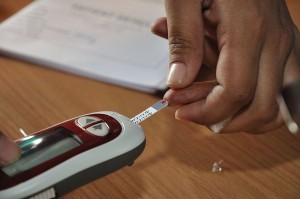Blood Glucose and Insulin
Checking Your Blood Glucose Level
Checking Your Blood Glucose
Reviewed and updated by Di Bush, PhD, Jan 1. 2014
Q: WHY SHOULD I MONITOR MY BLOOD GLUCOSE?
A: Checking your blood glucose gives you the information you need to understand how your diabetes treatment plan is working. Check your blood glucose several times per day at specific times, such as before a meal and two hours after. Look at the results from a period of several days or a week. You can see patterns in the times your blood glucose is up or down. You’ll see how your food, a regular walk, a stressful day or the addition of a new medication affects your blood glucose.

Q: WHERE DO I BEGIN?
A: First, talk with your health care providers to set your blood glucose targets. If your blood glucose is not within your target range most of the time, work with your health care provider, diabetes educator and/or Walgreens pharmacist to review your blood glucose monitoring records. Perhaps a simple change, such as being more physically active or eating different foods, can help you get closer to your targets. Over time, you will learn more about how to keep your blood glucose levels on track.
Q: WHAT IS THE A1C TEST?
A: Whether you have type 1 or type 2 diabetes, the A1c test is the most accurate, important and meaningful test for finding out your overall glucose control. A1c shows your average blood glucose for the two months to three months before the test. It also tells you your risk for complications. Research has shown that the closer your A1c is to normal (six percent or less), the less likely you are to develop complications, such as damage to the retina, kidney disease or nerve damage. It’s helpful to compare the A1c test result with your blood glucose monitoring results. Ask yourself if they make sense. If they don’t, you may need to check your blood glucose more often or at different times.
Your A1c level tells you that changes are needed. Your blood glucose test results give you clues about what to change. Checking your blood glucose at different times can help you answer questions about why your A1c doesn’t match your blood glucose readings. If your A1c test result and your blood glucose values are not on target, discuss with your health care provider ways to make changes in your diabetes care.
Checking Your Blood Glucose Allows You to
check the pattern of your blood glucose levels so you can make changes in your diet and exercise program or insulin dose.
- measure how changes in exercise, diet and insulin are helping your blood glucose level.
- arespond quickly to an increase or decrease in your blood sugar.
- create a treatment plan that will be best for you during an illness, together with your healthcare team best
Your healthcare team may recommend you test:
- Before meals
- 2 hours after a meal
- At bedtime
- At 3 a.m.
- When you sense that your blood glucose level is high
- More often on sick days
You may need fewer tests once you have a good idea of your blood glucose patterns.
Equipment Needed
- Lancet Device
- Lancets
- Test Strips
- Meter
- Alcohol Wipes (optional)
- Log Book
All tests use a drop of blood. The side of the tip of the middle or ring finger is the best and least painful place to obtain blood for most people, but you can use any finger, or even an earlobe for testing. Using the same finger (or pair of fingers) allows a callus or calluses to build up, making the testing less painful as time goes on.
Here are the steps for getting a drop of blood:
- Wash your hands with soap and warm water and dry them well or
- Clean the area with alcohol and dry well.
- Prick the fingertip with a small, pronged lancet. A spring lancet device gives a quick puncture with less pain.
- Hold your hand down, and “milk” the finger from the palm towards the tip. If little blood appears, wait a couple seconds and milk again. Do not squeeze close to the puncture.
- Turn your hand palm down, so that the drop hangs.
- Catch the drop of blood on the special test strip pad or test area.
- Follow the instructions given with your SMBG sensor or meter, and the instructions from your diabetes educator, for testing your blood glucose.
- Record your test result.
What should my blood glucose levels be?
Your personal goal for your blood glucose level depends on your age, type of diabetes, how long you’ve had it, overall health status, lifestyle, and desire for control. Here are some guidelines:
| Time: | Excellent | Good | Fair | Poor |
| Before a Meal (or fasting) | 60-100 | 100-140 | 140-180 | over 180 |
| After a Meal | 110-140 | 140-180 | 180-220 | over 220 |
Your healthcare team will help you set your goals. For some people, a blood sugar level below 80 mg is too low, while for others a level under 100 mg is too low. A level over 120 before a meal is too high for some, while for others it is normal.
Results
It is vital that you keep a record of your test results. You and your healthcare team will use the results to make safe changes to your diet, exercise plan and insulin or medicines. Make sure your blood glucose test record includes any events such as illness, stress or changes in your exercise program.



